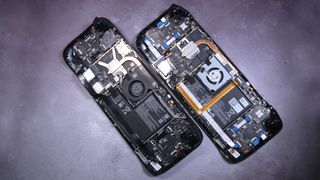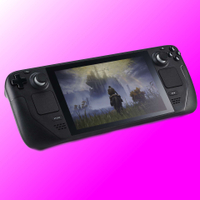Valve says its 'not really fair to your customers' to create yearly iterations of something like the Steam Deck, instead it's waiting 'for a generational leap in compute without sacrificing battery life'
Valve may not be creating yearly iterations of the Steam Deck, but it's having to give the same answer every year.

Valve Deck duo, Lawrence Yang and Yazan Aldehayyat, have been doing the press rounds recently as Australia is finally getting itself a proper Steam Deck release in that territory. As part of that, Yang and Aldehayyat have had to field the now-standard questions about a potential Steam Deck 2.
Unsurprisingly, their answer in an interview with Reviews.org (via Eurogamer) remains the same as last year, namely that Valve wants to wait until there is a tangible improvement in the technological ecosystem around handheld gaming PCs before even thinking about a new version.
Obviously the release of the Steam Deck OLED, the year after the original came out, might have led some folk to expect some sort of yearly cadence of Valve-y handheld tech updates. Though, probably not anyone who has had anything to do with Valve and PC hardware releases...
You only have to look at the Valve Index VR headset, and all the noises about a second version or sequel to that smart bit of tech, to see that Gabe's gang isn't about to spit out new, barely iterative hardware just for the sake of tacking a '2' onto the box. And if we want to talk about long-lost sequels, you could make a nod to Valve's software devs and a certain Freeman-related series.
And Valve's Deck team was also determined to make it clear when the OLED device came out that it absolutely wasn't a sequel. All of which means no-one should have expected it to be repeated this year.
For reference, Yang said in this latest interview that: "It is important to us, and we've tried to be really clear, we are not doing the yearly cadence."
"We're not going to do a bump every year," he continues. "There's no reason to do that. And, honestly, from our perspective, that's kind of not really fair to your customers to come out with something so soon that's only incrementally better. So, we really do want to wait for a generational leap in compute without sacrificing battery life before we ship the real second generation of Steam Deck. But it is something that we're excited about and we're working on."
The biggest gaming news, reviews and hardware deals
Keep up to date with the most important stories and the best deals, as picked by the PC Gamer team.
This almost precisely echoes what Yang told me around the launch of the OLED version last year: "It needs to be the right time," he tells me. "And we have to have the right parts for it. So we really want there to be a generational leap in performance for us to be able to comfortably call it a Steam Deck 2.
"We're keeping an eye on chips and APU that are available. The things that are available right now are not right yet. But maybe in two to three years, there will be something that is good in the same way that our current APU is, in terms of the power envelope, with performance, with battery draw. All of those things have to be in the sweet spot for a real move to a new chip."
"For us to make a second version," Aldehayyat then chimes in, "we will be able to have a substantial performance improvement while sticking to a similar kind of power range and weight to battery life. And that's not going to happen next year or the year after that. It's probably going to be more than that."
So, don't expect even some nominal update to the Steam Deck this year or even next year. I also asked the question about a Steam Deck Lite, and was told that wasn't something it was looking at. "I think that the next thing that we're working on moving forward is Steam Deck 2," Yang tells me.
I mean, at least we can be sure one is coming, just don't expect it anytime soon. And nor should you have.
Best handheld gaming PC: What's the best travel buddy?
Steam Deck OLED review: Our verdict on Valve's handheld.
Best Steam Deck accessories: Get decked out.

Dave has been gaming since the days of Zaxxon and Lady Bug on the Colecovision, and code books for the Commodore Vic 20 (Death Race 2000!). He built his first gaming PC at the tender age of 16, and finally finished bug-fixing the Cyrix-based system around a year later. When he dropped it out of the window. He first started writing for Official PlayStation Magazine and Xbox World many decades ago, then moved onto PC Format full-time, then PC Gamer, TechRadar, and T3 among others. Now he's back, writing about the nightmarish graphics card market, CPUs with more cores than sense, gaming laptops hotter than the sun, and SSDs more capacious than a Cybertruck.
Most Popular








